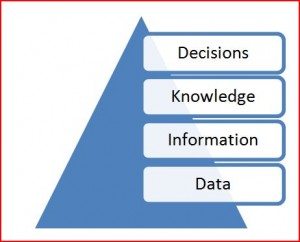Business Intelligence is all the rage right now. But what does this buzzword really mean and how can a business derive real benefits from it? This month we will look in depth at one aspect of business intelligence: Turning data into decisions.
The key to building systems that efficiently turn data into decisions is, to borrow a phrase popularized by Steven Covey, to “Begin with the end in mind.” In the case of BI systems the “end in mind” is generally to reduce or eliminate inefficiencies in the business. So the very first step is to clearly identify the desired change.
For example Acme Paints is often unable to ship orders for paint because a particular item is out of stock. Acme’s current process is to reorder whenever stock reaches a certain level. However, the fluctuating demand for paint often results in Acme’s being out of paint before new stock arrives. The desired change in Acme’s case is to reduce stock outs through better ordering decisions.
Next we look at the improvements we need to make better decisions. To do this we analyze the steps, starting with data collection, that lead to a decision:
The flow is Data (Facts) -> Information(Understanding Relationships) -> Knowledge(Understanding Patterns) -> Decisions (What to do). We analyze by starting with the decision and work backwards
Decision: Reorder part X on Y days (delivery lead time) before out of stock date.
Knowledge: (When part X will be out of stock)
Information: (Forecast utilization of part X)
Data: Facts (number of part X in stock, consumption rate)
So we need a system that tracks the number of parts in stock, forecasts part utilization and calculates when each part will be out of stock. With this knowledge we can figure in delivery lead time to decide when to reorder.
Designing a business intelligence system then is fundamentally about identifying a desired change in the business, determining the data necessary to improved decision making and then designing a system that collects that data and transforms it into the knowledge required to make better decisions.
If you’ve got inefficiencies in your business that you want to change, call Zev for advice on how to build a system to support the change.






